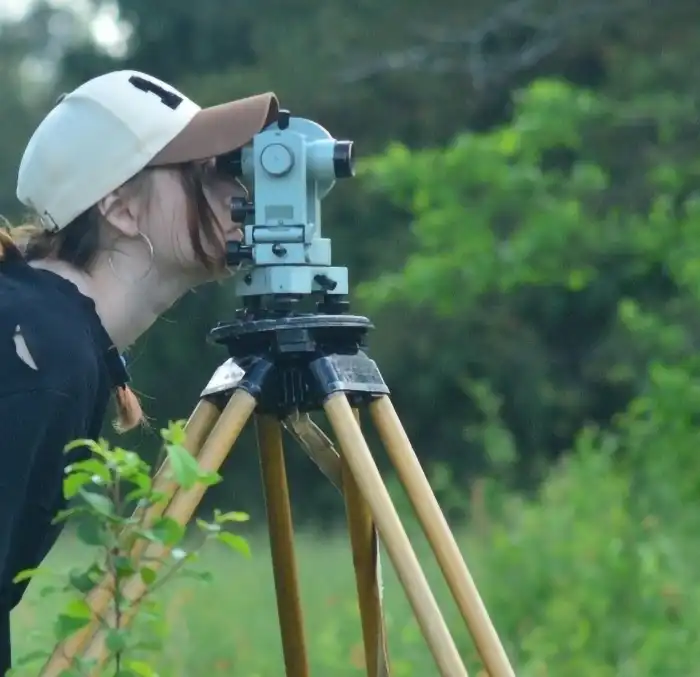
Maybe your property is smaller than the way it’s presented in the legal description. Maybe it’s bigger.
Maybe you don’t own the home yet, but your agent has noted that the lot size, as described, is off by a few yards, or a certain percentage of an acre.
The legal description of the property is what counts. A surveyor starts with a legal description to verify the property’s borderlines and dimensions.
So, if something is off, should you call in the surveyors before closing day? Will bringing this to the county’s attention change what you pay in property tax? Will your loan approval be thrown off track? You might hesitate to say anything that might derail or delay your deal. But — especially if the discrepancy is significant — a resolution is valuable. Property descriptions need to be accurate for anyone who insures, bequeaths, sells or receives the deed later on.
Survey Says…
If you already hold the deed, and are not sure about your property’s size or dimensions, you can call the title company that did your title research and worked with you at closing. Discuss your question with a title agent at the company.
Perhaps you ordered, and the title firm issued you, an owner’s title insurance policy. If so, check the title policy for coverage and guidance. The title firm could expressly reject claims filed for properties whose owner had no survey done. In other words…
A person who buys land should get a survey.
You can continue to negotiate with the seller if your deal is still pending. And if you have yet to close, you can back out of your agreement. Your contract might allow for the recovery of earnest money over serious, unexpected findings. In this case, your appraisal report might be in question, due to conflicting information about the property’s actual size. There is a major title issue to address if the actual dimensions put the property under the margins necessary for residential zoning minimums and / or setback rules.
Learn about the snags that can trip up a deal when a home sale is pending, and what to do now.
Surveys Can Change, Because Land Can Change

A new survey isn’t done in every real estate deal. A regular title search doesn’t include it.
A mortgage lender, by default, does expect a title to be researched and insured. The lender might ask the buyer to hire a property surveyor as well. This can be carried out during the time when the inspection is ordered and the buyer is waiting for the appraisal to take place.
The contract between buyer and seller could also stipulate that a survey shall be included. Either the seller or buyer may decide to hire a surveyor to validate the information on the deed, and ensure what’s recorded is current.
If you are not working with a lawyer, the lender or the title company will need to address any discrepancy with your property. Even if no lender is involved in a purchase, it’s important to confirm that the deed’s legal description is accurate.
Usually, you can find a legal description of a property on the deed. You may want to get a copy of your current deed to check.
In any case, land does change over time. There might be new structures, additions to the home, new easements, erosion — even another deed holder with an adverse possession claim.
Guard your title. Learn more at Deeds.com about how buyers choose between standard and enhanced title insurance policies.
It’s Best Not to Assume.
You’re buying a home property. You know where it is and how big it is. But are other people using some part of it? Has anything been built or planted that encroaches on your parcel?
A survey will shed light on any informal paths that run over your land, any encroaching fences, and any significant changes in land features. It’s quite common for a surveyor to find easements that would not be apparent during an inspection or home tour.
When in doubt, it’s worth considering that hiring a surveyor can both settle discrepancies and, in some cases, reward the purchaser. This is because a survey that verifies a suspected problem helps a buyer negotiate a price adjustment. Additionally, it’s valuable to know where utility pipes and access are, and where you can and cannot dig or build. The survey will give a buyer the lowdown on setbacks — the margins of the land where nothing can be installed.
Just Buying a Condo, Not Land?
Perhaps you’re concerned about the interior dimensions of a unit only. You might not care about a few feet here and there, but you’ll want to know if the real dimensions vary from what the listing says.
When you purchase the unit — probably without your asking — your real estate agent will bring a tape measure and write down all the dimensions of the unit, and compare it with the property documents and the listing.
An appraiser will occasionally find discrepancies. For instance, the appraisal report could state: “County records show the unit comprises 750 square feet. According to a physical measurement, the actual unit size is 950 square feet.”
Condo associations occasionally must update their master deeds. Here’s how it’s done, in seven steps.
How the County Updates a Deed
If there’s an issue with your deed involving a typo or omission, a correction deed may be what you need. Typos can be sticky. That is, the stated acreage (and typo) in a legal description could have been copied through previous transfers. State and county rules likely direct that the new, corrective deed must be signed, witnessed, and notarized. There will be a fee for recording the new deed.
If the property is bordered by any body of water, check for changes by hiring a surveyor. The boundary lines can erode due to the action of the water. If so, the property acreage and the legal description on the deed will need updating. Loss of land will mean the home’s taxable value should be reassessed.
Also note that your home’s county may have official procedures and forms to let buyers record boundary line adjustments. The buyer would set up surveys and inspections through the county planning department. If the adjustments are approved, the county will date, stamp, and notarize the new property documents. The county assessor will then revise the property taxes.
Final Note
As always, we publish the above information to help readers get an orientation to subjects involving deeds and the transfer of real estate. No website substitutes for licensed legal professionals in case-specific situations.
Your county officials and the surveyors, appraisers, inspectors, and assessors can all explain what their records show. What they can’t do is give legal advice. If you run into confusion, it’s best to speak with an experienced local real estate lawyer.
Supporting References
Deeds.com: The Property Survey: Do You Need One? (Sep. 8, 2020).
Deeds.com: Is the Deed Still Good After Erosion? (Jun. 7, 2024).
And as linked.
More on topics: Hybrid appraisals, What is a plat map?, Working with a neighbor to resolve disputes
Photo credits: Joice Rivas and Mila K, via Pexels/Canva.
